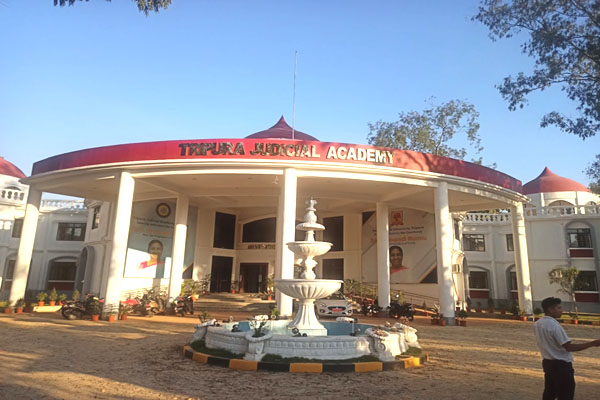
Tripura Records 40.1% Child Marriage Cases: Stakeholders Unite to Combat the Crisis
Agartala, Jan 11, 2025, By Our Correspondent104
Child marriage continues to be a significant social issue in India, disproportionately affecting the lives of young girls, depriving them of education, health, and opportunities. Among the states with alarmingly high rates, Tripura stands out, with 40.1% of girls married off before the legal age, as reported in the National Family Health Survey (NFHS 5.0).
This rate marks an increase from 33.1% in NFHS-4, underscoring the urgent need for targeted interventions. The rise has prompted calls for stricter enforcement of laws and enhanced community engagement to address the systemic causes of child marriage, particularly in rural and economically disadvantaged areas.
The Root Causes of Child Marriage
Several factors contribute to the prevalence of child marriage in Tripura, including:
- Poverty: Financial hardship pushes many families to view early marriage as a means of reducing economic burdens.
- Cultural Norms: Deeply ingrained traditions and societal expectations often perpetuate child marriage, particularly in rural communities.
- Lack of Awareness: Many families remain unaware of the legal consequences and harmful impacts of child marriage on health and education.
State Multi-Stakeholder Dialogue: A Collective Effort
In response to the growing crisis, the National Law University (NLU) of Tripura, in partnership with UNICEF, organized a State Multi-Stakeholder Dialogue on the Effective Implementation of Child-Specific Legislations. The event was held on Friday at the TJA Auditorium in Agartala.
The dialogue brought together policymakers, legal experts, educators, community leaders, and social activists to address the multifaceted issue of child marriage and propose actionable solutions.
Key Discussions and Insights
NLU Vice-Chancellor’s Address
Dr. Yogesh Pratap Singh, Vice-Chancellor of NLU Tripura, set the tone for the event by emphasizing the severity of the problem.
“Despite tremendous progress in almost all sectors, the issue of child marriage remains critical, even after 75 years of India’s independence,” he said.
Dr. Singh presented district-specific data to highlight the disparity across Tripura, stressing the importance of local solutions. He pointed out how child marriage severely impacts health, education, and the overall development of children, particularly girls.
Insights from the CWCR Director
Dr. Debasree Debnath, Director of the Centre for Women and Child Rights (CWCR), provided an in-depth analysis of the challenges in enforcing child-specific laws. She called for a collaborative approach, emphasizing the role of education, awareness campaigns, and community engagement.
She further noted that while legislation such as the Prohibition of Child Marriage Act (2006) exists, its enforcement is often hindered by socio-economic challenges and lack of awareness in rural areas.
Field Realities Shared by the Dhalai DM
Saju Vaheed A, DM and Collector of Dhalai district, shared his on-ground experiences and insights during his address titled “Role of State-Specific Initiatives in Combating Child Marriage and Balika Manch.”
“Despite improvements in education and child welfare, cultural norms and economic pressures continue to drive child marriages in Tripura, particularly in rural and conservative areas,” he said.
He highlighted the effectiveness of initiatives like Balika Manch, a community-based platform empowering adolescent girls. However, he also acknowledged that poverty, lack of infrastructure, and societal pressures remain significant barriers to reducing child marriage rates.
The DM pointed out the alarming statistics, noting that both Tripura and Assam have shown higher rates of child marriage than the national average in both NFHS-4 and NFHS-5. He called for a holistic approach that combines legal enforcement, education, and community-based interventions.
Inspiring Voices: The Story of Jyotsna Akhtar
The event concluded on an inspiring note with the story of Jyotsna Akhtar, a child marriage rescuer from South Tripura and recipient of the Pradhan Mantri Rashtriya Bal Puruskar in the social service category.
Now a student in Class XI, Jyotsna has been instrumental in preventing several child marriages through her work with Balika Manch. Sharing her experiences, she said, “Change begins with awareness. We need to educate families and communities about the harmful consequences of child marriage.”
Her story resonated with attendees, exemplifying how grassroots efforts can make a tangible difference.
The Way Forward
The dialogue concluded with stakeholders unanimously agreeing on the need for coordinated efforts to combat child marriage. Key recommendations included:
- Strengthening Legislation: Ensuring stricter enforcement of the Prohibition of Child Marriage Act (2006) and holding offenders accountable.
- Community Awareness Campaigns: Raising awareness about the negative impacts of child marriage through educational programs and outreach initiatives.
- Empowering Girls: Promoting initiatives like Balika Manch that provide platforms for girls to voice their concerns and build resilience.
- Poverty Alleviation Measures: Addressing economic challenges through skill development programs and financial support for families.
- Enhanced Collaboration: Encouraging partnerships between government, NGOs, and local communities to implement sustainable solutions.
A Call to Action
The speakers expressed hope that the dialogue would serve as a catalyst for change, fostering a collective effort to eradicate child marriage in Tripura and beyond. As India progresses towards its developmental goals, addressing this deeply entrenched issue remains a priority to ensure the rights, safety, and future of its children.